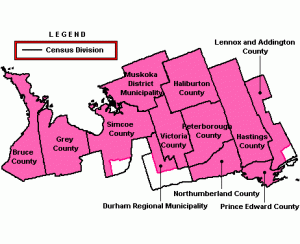By Robert Washburn
 There is a lot of good news for the local economy lately, which is encouraging for Northumberland County residents. Still, there are reasons for taxpayers to be concerned.
There is a lot of good news for the local economy lately, which is encouraging for Northumberland County residents. Still, there are reasons for taxpayers to be concerned.
China’s Bright Food took control of U.K. breakfast cereal maker Weetabix last week, leaving the employees at the local plant in Cobourg wondering about their future. Despite assurances from the vice-president of operations for North America, the fate of the 250 people working in Cobourg cannot be assured. Too many times residents have watched as head offices far away close local operations, leaving a wake of unemployment and empty buildings.
Then, there was the less than exciting tour stop by Ontario Economic Development and Innovation Minister Brad Duguid, who dropped by Bakkavor Foods Canada recently to pat himself and his government on the back for its $1.17 million grant to the company. With 50 employees and plans to expand, the public relations event was little more than a political party looking for a good news story. No doubt, former Liberal MPP Lou Rinaldi wanted a springboard to announce his intentions to seek the local nomination for the provincial Liberals in the next election.
Next, there was the announcement related to the importance of the agriculture and agri-foods industry. In March, the Canadian government released an economic report on the state of the industry, which stated one in eight jobs in Canada rely on farmers and food processors. Eight per cent of the Gross Domestic Product is generated by farmers and these industries, along with companies like Weetabix and Bakkavor, making this a significant portion in the local economy.
Finally, the last bit of economic news was the unemployment statistics, as the Central Ontario Region experiences a drop from 9.1 per cent nearly a year ago to 7.2 per cent last month. That is not just Northumberland, but an area stretching from the shores of Lake Huron in the west to Lennox-Addington in the east and going as far north as Muskoka.
So how should we to view what is going on?
The number of organizations and publicly funded bureaucracies related to local economic development is huge. Northumberland County, Port Hope, Cobourg and other municipalities have economic development officers and committees. Then, there is the Business Advisory Centre Northumberland. And then, there is the Community Futures Development Corporation, who provides financial support to businesses. There are the various downtown business improvement committees, as well as the Northumberland Chamber of Commerce.
But the question for taxpayers is simple: Are we getting value for our money. The hodgepodge of economic news is mixed, as we have already pointed out. But it is questionable the degree to which all these bureaucrats, politicians and committees really influence any factors remains a bit hazy. And local taxpayers should be questioning whether or not to be spending public money on them.
Certainly organizations like the chamber are membership-funded and are held accountable through their own boards and members.
Yet, the publicly funded organizations represent millions of dollars, time and resources. It is not always clear how the performance of each player in the local economic development mix is measured. Certainly annual reports present a sunshine-and-roses picture of the work. Still, for every dollar spent, a direct benefit should be found.
As new businesses open, far too many stores ront remain empty. Massive shifts in global economy are far beyond the influence of local politicians and business people. Yet, where are the comprehensive strategic plans that create a clear picture into the future being set out by local business and political leaders?
The organizations, agencies and bureaucracies in Northumberland languish in their silos producing uneven results, where some programs excel and others crawl along. For far too many years, local politicians have based their focus on residential development as an economic stimulus and a generator of tax revenues.
Northumberland County needs a political leader who is willing to take on the tough task of peering into the complexity of local economic development, asking the uncomfortable yet necessary questions, to ensure the long-term prosperity of the area.


